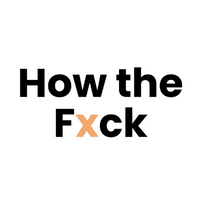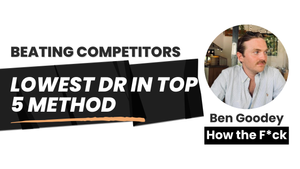I love working with brands who’ve underinvested in their SEO.
I love working with brands who’ve underinvested in their SEO.
It can be a frustrating place to be:
You suspect SEO is a positive ROI channel.
I mean…all your competitors are doing it.
But you also know you’ll have to overcome years of consistent effort, which can feel insurmountable.
But, good news…beating the “big boys” is possible.
Bigger brands get lazy.
- They stop investing
- They miss good keywords
- They undervalue lower volume opportunities
- They rely on authority, instead of content quality
The fun part of the challenge is finding these gaps and snagging the traffic.
Over time, as you build site authority, you can go after more and more competitive terms.
And before they see what’s coming?
You’re one of their biggest search competitors.
From behind. To leader.
In this week’s newsletter, I want to take a look at just one method of finding gaps where your competitors are currently weak (and even YOUR site can rank fast).
The "Lowest DR in Top 5" Method (Part 1)
The first method is to look for keywords currently being won by sites with lower authority than yours.
This is the “Lowest DR in Top 5” method.
The logic is that if they can rank well for the keyword, despite having weaker authority than you, so can you.
(But this isn’t always the case, so read to the end)
Here’s what to do:
- Find your DR in Ahrefs/Semrush (Example: DR = 45)
- Go to the keyword explorer
- Search for a broader parent topic
- Look for matching terms
Then, filter by “Lowest DR” lower than your own DR.
This simply brings up all the keywords where a site with a lower authority than yours ranks in the Top 5.
Browse through the available keywords and look for attractive ones for your brand (look first for high-converting keyword opportunities).
When you find one that looks good, great. Choose it and let’s look at the SERP to see if it’s really as low competition as it first appears.
Here’s an example that’s likely winnable by a >35 DR site. It’s got a fairly average word count and only 2 domains backlinking.
Here’s an example of a red herring opportunity:
Why would I avoid this particular keyword?
Yes, the site at #1 is a low DR.
But, this site is likely ranking for other reasons, such as:
- The root domain name contains the keywords
- It has 139 backlinking domains
- It is a homepage ranking
These make it much harder to beat for the budget and time-conscious.
Here’s another example for the keyword, “call center tools”:
This is a low-competition opportunity for sites with greater than 45 DR.
If I only saw the red-highlighted SERP, I would likely avoid it. Again, it’s a homepage and has 455 linking domains making this a red herring.
However, the one highlighted green is a simple blog post with zero links. I think I could beat that with my DR 55 client site and a 3,000 blog post ✅.
Quick Strategy Tip
Thinking of using the “Lowest DR in Top 5” method?
Be aspirational with your “Lowest DR”.
Your site may currently have a DR 35. But where will it be in 12 months?
If you’re actively link-building or doing PR, you might be a DR 50 by then—giving you WAY more options for lower competition keywords.
As your site gets more strong and more competitive, more opportunities open up.
So I recommend building in a balance of short-term and long-term wins.
Two More Methods
In next week’s newsletter, I’ll share two more methods of finding opportunities where your competitors are weak.
These ones are much less talked about.
Stay tuned.
—Benny


